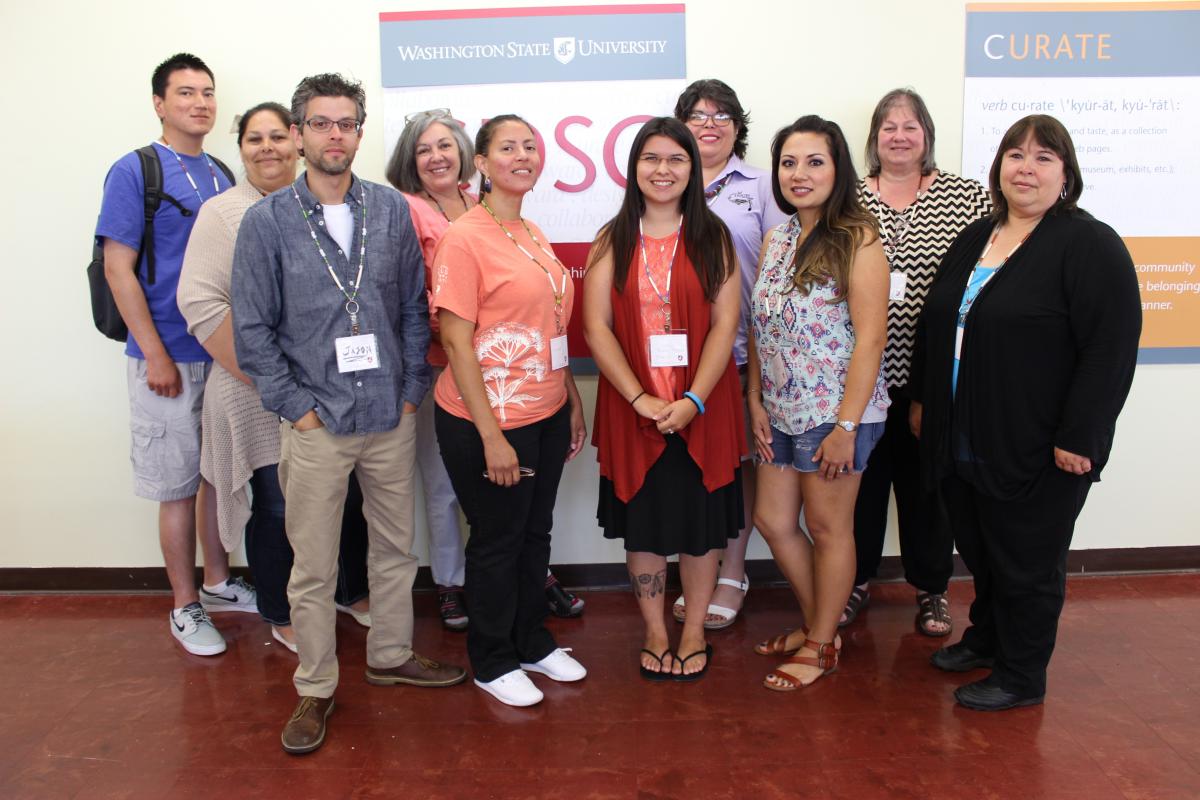Blog Posts | September 15, 2015
Share ThisBy Dr. Kimberly Christen
Associate Professor and Director, Digital Technology and Culture Program
Director of Digital Projects, Native American Programs
Co-Director, Center for Digital Scholarship and Curation
Washington State University
On July 19th the Center for Digital Scholarship and Curation at Washington State University’s (WSU) Libraries opened our doors to the first Tribal Stewardship Cohort participants for a year-long program covering the lifecycle of digital stewardship. In a matter of minutes, the space was converted into a lively site of sharing, discussion, and hands-on learning emphasizing the specific needs of Tribal archives, libraries, and museums (TALMs). Over the next year, twelve cohort members from six tribal archives, libraries, museums, and cultural centers across the United States will come to WSU four times, as well as participate in monthly virtual training sessions.

Jason Wesaw (Pokagon) shares a story from his tribe with fellow cohort members Angela McLaughlin (Karuk) and Elizabeth James Perry (Wampanoag). Photo by Nella Letizia, Washington State University Libraries
The Tribal Stewardship Cohort Program: Digital Heritage Management, Archiving and Mukurtu CMS Training project is a three-year IMLS funded program for tribal archives, libraries, and museums designed to provide a holistic digital stewardship curriculum. We use a cohort-based educational model to emphasize the shared nature of digitization and preservation strategies, challenges, and opportunities especially for TALMs where it is common to find small staffs or a lone librarian undertaking a range of tasks. While technology is certainly important, our program recognizes the need for culturally responsive and ethically-minded practices of digitization for cultural heritage materials that are not merely “content”--but living languages, family histories, community practices, and traditional knowledge. Each unit of the curriculum has cultural issues at the center of discussion, practical skills, and technological resource guides.
Our goal is to provide long-term educational opportunities in digital heritage management and preservation with an emphasis on flexible models and cohort-specific needs. The program provides participants with hands-on training in specific workflows and models for managing and sharing digital resources, the digitization, management and preservation of content-specific types including film, audio, video, and documents; and the use of Mukurtu CMS to provide access to their digital heritage using tribal specific cultural protocols. At the conclusion of the first year of this pilot program all the content from the curriculum will be freely available on our Sustainable Heritage Network website, including video tutorials, hands-on demonstrations, slides, screencasts, and sample policies. We hope to encourage others to share topic specific, practical skill building educational resources for TALMs.

The first Tribal Stewardship Cohort participants. Photo by Nella Letizia, Washington State University Libraries
Cohort members are:
Crystal Douglas, the Museum Director of the Kansa Museum, and Lauren Murray, Librarian, Kaw Nation, Kaw City, Oklahoma
Angela McLaughlin, the Sipnuuk Digital Library Assistant, and Bari Talley, the Karuk People’s Center Coordinator of the Karuk Tribe, in Orleans and Happy Camp, California
Elizabeth James-Perry, the Senior Cultural Resource Monitor for the Aquinnah Wampanoag Tribe in Aquinnah, Massachusetts
Regina Bishop, Native Monitor and Gloria A. Morgan, Cultural Resource Committee, the Tejon Indian Tribe in Bakersfield, California
Marcus Winchester, the Interim Director and Tribal Historic Preservation Officer of the Department of Language and Culture, and Jason Wesaw an artist of the Pokagon Band of Potawatomi Indians in Dowagiac, Michigan
Keeley Parker, the Archivist at the Makah Cultural and Research Center, and Assistant Archivist Jamie Parker of the Makah Tribe, Neah Bay, Washington
Dr. Kimberly Christen is the Director of the Tribal Stewardship Cohort Program and Mukurtu CMS and the co-Director of the CDSC at WSU.
